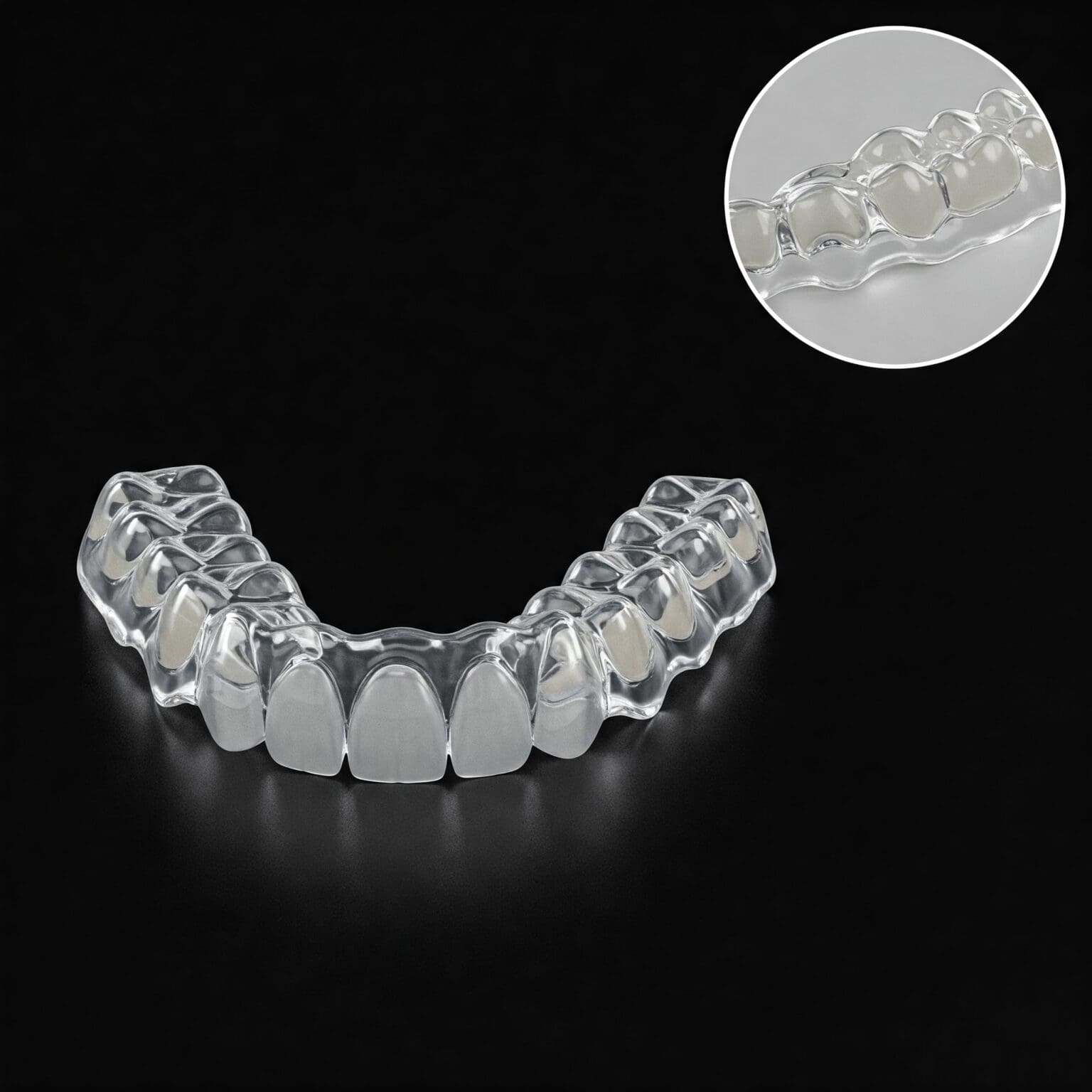If you have sleep apnea, you might snore loudly and sometimes wake up because of it. You might also feel like you haven’t slept well at all. Snoring happens because your airway doesn’t always stay open while you sleep. We offer snoring solutions and sleep disorder treatments that could help with this problem at Columbia Family Dentist.
Sleep apnea blocks your airway and stops your breathing during sleep. This can happen many times throughout the night, causing loud snoring and breaks in breathing.
People who have sleep apnea may also experience:
- Daytime sleepiness
- Problems with concentration
- Memory problems
- Irritability
- Depression
- Morning headaches and migraines
Sleep Apnea Treatment at our Columbia, MD, Dental Office

Our dentists can help with your sleep apnea issues. Our goal is to ease your symptoms and help you get a good night’s sleep. Treating sleep apnea is important for your overall health. For example, it can lower your risk of serious issues like heart problems or stroke.
Sleep apnea symptoms can include:
- Loud snoring
- Drowsy during the day
- Difficulty breathing while you sleep
- Loud gasps of air while you sleep
- Abrupt awakenings accompanied by gasping or choking.
- Dry mouth or sore throat
- Headaches or sore jaw
Dental Treatment Options
Dr. Sahil Goyal offers custom sleep guards or oral appliances for mild to moderate sleep apnea, or if you can’t use a CPAP machine. This device keeps your airway open while you sleep by holding your jaw in a better position for breathing.
Patients like our custom night guards because they’re discreet, comfortable, and easy to carry versus a CPAP machine. We make these guards using molds of your teeth to ensure they fit well and stay in place. Many people with sleep apnea also grind their teeth at night, a condition called bruxism.
Bruxism can wear down your teeth, cause gum problems, and lead to headaches. While bruxism isn’t usually serious, it can signal other issues. You should treat it early to avoid long-term damage. A dental appliance like an occlusal splint or bite guard can help prevent this grinding at night.
Quick Comparison: CPAP vs. Oral Appliance Therapy
| Feature | CPAP Machine | Oral Appliance |
|---|---|---|
| How It Works | Uses air pressure to keep airway open | Moves jaw forward to open airway |
| Best For | Mild to severe sleep apnea | Mild to moderate sleep apnea |
| Size | Bulky machine with mask and hose | Small device fits in your pocket |
| Noise | Can be noisy | Silent |
| Travel | Hard to travel with | Easy to take anywhere |
| Comfort | Takes time to adjust | Most people find it comfortable |
| Side Effects | Mask leaks, dry nose, skin marks | Jaw soreness, tooth discomfort (usually temporary) |
Non-medical Treatment Options
You can also treat sleep apnea at home if you don’t have life-threatening symptoms. However, always consult with your doctor before assuming your diagnosis. At-home treatments may include:
- Weight loss and exercise
- Stop consuming alcohol
- Avoid taking sedatives and sleeping pills
- Sleeping on your left side
- Quit smoking
- Treat allergies and nasal congestion
- Gargling water before going to bed
Patient Review
Sleep Apnea FAQs
Can I Cure Sleep Apnea Naturally?
You can reduce or even cure mild sleep apnea at home without seeing a doctor. The most common natural method to stop sleep apnea is to lose weight. Weight gain frequently leads to sleep apnea issues. Keeping a healthy weight can be a natural way to try to solve sleep apnea.
Inflammation can also make it worse by irritating your airways. Some everyday foods and supplements can help:
- Turmeric or ginger tea: These contain natural ingredients that fight inflammation.
- Omega-3 supplements: Like fish oil, they help reduce swelling in your throat that blocks breathing at night.
- Honey in warm water: Soothes a scratchy throat and has germ-fighting benefits too.
These easy fixes work best alongside other healthy habits, like weight loss, for milder cases of sleep apnea.
What Is the Root Cause of Sleep Apnea?
The main cause of sleep apnea is being overweight. Extra body fat, especially around the neck, can put pressure on the airway. This pressure makes it harder for air to pass through your trachea.
However, other factors can also contribute to sleep apnea, including genetics, age, and certain health conditions. For example, people with large tonsils or a small jaw may be more likely to experience airway blockages.
What Vitamins Help With Sleep Apnea?
Vitamins C and E can help improve sleep apnea symptoms by reducing inflammation in your airways. Since swelling can make breathing harder at night, these vitamins’ antioxidant effects could provide some relief. Vitamin C helps maintain healthy blood vessels and oxygen flow, while vitamin E protects delicate throat tissues.
You won’t cure sleep apnea with vitamins alone, but adding them to your overall treatment plan might help. Try getting more vitamin C from foods like oranges and bell peppers, and vitamin E from almonds or spinach. Of course, always talk to your doctor before trying new supplements. Remember, these work best when combined with other apnea treatments your doctor recommends.
How Long Are Breathing Pauses in Sleep Apnea?
Breathing pauses during sleep apnea typically last between 10 and 30 seconds. In some cases, they can be even longer. These pauses can happen repeatedly throughout the night, sometimes up to 400 times.
Your brain sends signals to wake up just enough to restart breathing each time you stop breathing. This disrupts your sleep, even if you don’t remember waking up. Over time, these constant interruptions can lead to extreme fatigue, difficulty concentrating, and other health problems.
Does Sleep Apnea Happen Every Night?
Yes, if you have sleep apnea, it typically affects you night after night. Your breathing keeps stopping and starting while you sleep, which prevents you from sinking into that deep, restorative sleep your body needs. That’s why you might wake up feeling exhausted even after a full night in bed.
This nightly struggle doesn’t just leave you tired. It can actually lead to bigger health problems down the road, like high blood pressure and heart issues. Once properly diagnosed, sleep apnea is very manageable. With the right treatment, you can finally start getting the quality sleep you’ve been missing.
Schedule A Dental Exam Today
A good night’s rest is invaluable to your mental and physical health. We understand that a sleep disorder or sleep apnea could be taking a great toll on your wellbeing. If you have sleep apnea or suffer from the common signs of a sleep disorder, let our team at Columbia Family Dentist help you.
Schedule an appointment online with our doctors or call our office at 410-670-8211. As an experienced dentist in Columbia, MD, Dr. Goyal will create a plan to restore your overall health and the quality of your sleep.
